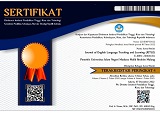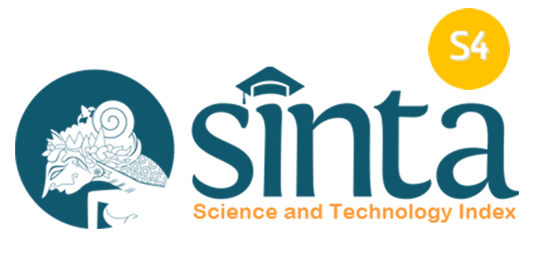Corrective oral feedback on students’ errors in speaking courses
Abstract
It is considered essential to improve students' speaking abilities in order to communicate in English. Unfortunately, students face a variety of difficulties in acquiring their speaking skills. Despite the fact that corrective feedback is claimed to have an influence on students' performance, particularly in speaking courses, research focused explicitly on the perceptions of students and lecturers on corrective feedback in speaking courses is still rare. Employing descriptive study including observation and survey methods, the findings revealed three results: the length of oral corrective feedback given by the lecturer, the forms of oral corrective feedback offered by lecturer in speaking courses, and the types of oral corrective feedback most desired by students during speaking courses particularly students taking courses of Speaking for Social Intercultural Communication and Speaking for Academic Purposes. The present study indicates that the teachers should be able to recognize which errors to correct and which sorts of corrective feedback to employ in their speaking classes.
Keywords
Full Text:
PDFReferences
Akhyak, M., & Indramawan, I. (2013). Improving the students english speaking competence Storytelling (Study in Pengeran Diponegoro Islamic College (STAI) of Nganjuk, East Java, Indonesia. International Journal of language and Literature. 1(2).
Ammar, A. (2003). Corrective feedback and L2 learning: Elicitation and recast. Unpublised Thesis. Montreal : Montreal. Mc Gill University.
Atma, N., & Widiati, U. (2015). EFL students’ preferences for corrective feedback in speaking instruction across speaking course levels. Bahasa dan Seni. 43(2). 183-195.
Bogdan, C., & Sari K. (1992). Qualitative research for education: An introduction to theory and methods. Allyn & Bacon.
Bogdan, C., & Sari K. (2003). Qualitative Research for Education: an Introduction to Theory and Methods, (Online), (http://n.ereserve.fiu.edu/010013009-1.pdf), on 25th November 2022.
Brookhart, S. (2008). How to give effective feedback to your students. ASCB.
Buyukbay, S. and Dabaghi, A. (2010). The effectiveness of repetition as corrective feedback. Journal of Language Teaching and Research, 1(3), 181–193.
Choi, S., & Shaofeng L. (2012). Corrective feedback and learner uptake in a child. TESOL Quarterly. 43(3): 331-351.
Dilans, G. (2010). Corrective feedback and L2 vocabulary development: Prompt and recasts in the adult ESL classroom. The Canadian Modern Language Review. 787-815.
Ellis, R. (2006). Researching the effects of form-focused instruction on L2 acquisition. AILA Review, 19, 18-41.
Ellis, R. (2009). Corrective feedback and teacher development. L2 Journal. 1(1), 3- 18.
Ellis, R., & Younghee S. (2006). Reexamining the role of recasts in second language acquisition. Studies in Second Language Acquisition. 28, 576-600.
Fungula, B. (2013). Oral corrective feedback in the Chinese EFL classroom. Karlstads Universitet: Unpublished Thesis.
Han, Z. (2002). A study of the impact of recasts on tense consistency in L2 output. TESOL Quarterly. 36(4), 543-572.
Handoyo, F. (2010). Improving English implicit grammar knowledge using semantic syntactic translation practice. TEFLIN Journal, 21(2), 186-201.
Harmer, J. (2007). The practice of English language teaching (4th Edition). Pearson Longman.
Hedge, T. (2000). Teaching and learning in the classroom. Oxford University Press.
Hendrickson, J. (1978). Correction in foreign language teaching: Recent theory, research, and practice. A historical perspective of learner errors. The Modern Language Journal, 62(8), 387-398.
Hillary, S. (2002). Correct me if I’m wrong: Investigating the preferences in error correction among adult English language learners. University of Central Florida: Unpublished Thesis.
Ihsan, D. (1999). Speaking and writing errors made by students of English Education. Jurnal Ilmu Pendidikan, 6(3), 222-234.
Kennedy, S. (2010). Corrective feedback for learners of varied proficiency levels: A teacher’s choices. Spring TESL Canada Journal, 27.
Lyster, R., Kazuya S., & Masatoshi S. (2013). Oral corrective feedback in Second Language classrooms. Language Teaching, 46(1), 1-40.
Lyster, R., & Kazuya S. (2010). Oral corrective feedback in classroom SLA. Studies in Second Language Acquisition, 32, 265-302.
Lyster, R., & Panova, L. (2002). Pattern of corrective feedback and uptake in an adult ESL classroom. TESOL Quarterly Journal , 36, 573-595.
Lyster, R. (2004). Differential effects of prompts and recasts in form-focused instruction. SSLA, 26, 399-432.
Martinez, G. (2006). Should we correct our students errors in L2 learning?. Encuantro, 16, 1-7.
Méndez, E., & Cruz, M. (2012). Teachers’ perceptions about oral
corrective feedback and their practice in EFL classrooms. Issues in Teachers' Professional Development, 14(2), 63-75.
Moedjito, M., & Harumi, I. (2008). Perceptions of the seriousness of mispronunciations of English speech sounds. TEFLIN Journal, 19(1), 70-93.
Nunan, D. (1991). Language Teaching Methodology: A textbook for teachers. Prentice-Hall.
Nunan, D. (1996). The self directed teacher managing the learning process. Cambridge University Press
Nunan, D. (2003). Practical english language teaching. McGraw Hill.
Park, H. (2010). Teachers’ and learners’ preferences for error correction. Unpublished master’s thesis. California State University, Sacramento, USA.
Rahmi, S. (2017). Types of corrective feedback used by four lecturers on students’ speaking performance. INOVISH Journal, 2(2), 79-95.
Roberts, R. (2012). Task repetition: Helping students to improve accuracy, repertoire and fluency. (Online), (https://elt-resourceful.com/2012/11/14/task-repetition-helpingstudents-to-improve-accuracyrepertoire-and-fluency/, on 30th October 2022.
Serra, R. (2014). The importance of giving feedback, (Online), (http://www.richmondshare.com.br/the-importance-of-giving-feedback/), on 5th February 2022.
Sheen, Y. (2004). Corrective feedback and learner uptake in communicative classroom across instructional setting. Language Teaching Research, 8(3), 263-300.
Sheen, Y. (2011). Corrective feedback, individual differences and second language learning. American University: Department of Language and Foreign Studies.
Sheen,Y., & Ellis, R. (2011). Corrective feedback in language teaching. In E. Hinkel (Ed), Handbook of Research in Second Language Teaching and Learning (pp.593-607). Routledge.
Suryanto, S. (2014). Issues in teaching English in a cultural context: A case of Indonesia. Journal of English Literacy Education, 1(2), 75-83.
Tomcyzk, E. (2013). Perceptions of oral errors and their corrective feedback: Teachers vs. students. Journal of Language Teaching and Research, 4(5), 924-931.
Tripudiyana, T., Sartika, D., & Nery, R. (2022). A Correlation between Students’ Self-Esteem and Speaking Skill. Journal of English Language Teaching and Learning (JETLE), 3(2), Article 2. https://doi.org/10.18860/jetle.v3i2.15610
Truscott. (1999). The case for “The cast against grammar correction in L2 writing classes”: A response to ferris. Journal of Second Language Writing, 8(20), 111-122.
Rohmana, W. I. M. (2017). The Implementation of Performance Assessment in Curriculum 2013 (A Case Study at the Eleventh Grade of SMAN 1 Magetan in the Academic Year of 2016/2017) [Universitas Sebelas Maret]. https://digilib.uns.ac.id/dokumen/detail/65955/The-
Implementation-of-Performance-Assessment-in-Curriculum-2013-A-Case-Study-at-the-Eleventh-Grade-of-SMAN-1-Magetan-in-the-Academic-Year-of-20162017
Rolin-Ianziti, J. (2010). The organization of delayed second language correction. Language Teaching Research, 14(2), 183-206.
Yoshida, R. (2008). Teacher’s choice and learners’ preference of corrective feedback types. Language Awareness, 17(1), 78-93.
Yoshida, R. (2010). Teachers’ choice and learners’ preferences of corrective feedback types. Sidney: University of New South Wales
Zhang, Y., Zhang, L. & Ma, L. (2010). A brief analysis of corrective feedback in oral interaction. Journal of Language Teaching and Research, 1 (3), 306-308.
DOI: https://doi.org/10.18860/jetle.v4i2.20442
Refbacks
- There are currently no refbacks.
Jalan Gajayana 50 Malang 65144, Jawa Timur, Indonesia

This work is licensed under a Creative Commons Attribution-ShareAlike 4.0 International License.
Indexed by





